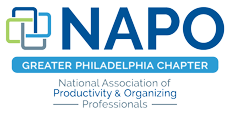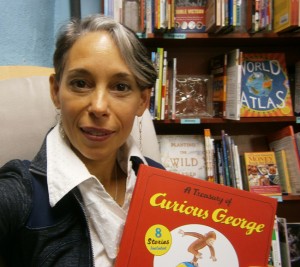Kids May Have Curious George, But Adults Now Have Curious Accountability!
Like Curious George, who stimulates children’s natural curiosity about the world around them, Curious Accountability offers adults a new perspective for tasks associated with getting organized; one where they embark on an exciting journey of self discovery and realized goals. This methodology turns the act of getting organized into a skill building activity. Personal ‘aha’ moments promote longer lasting effects for those who want to get organized and remain organized over time.
At the National Association of Professional Organizers conference in New Orleans last month, Casey Moore and Cameron Gott introduced the concept of Curious Accountability. They defined this concept as “a positive evaluation process based on respect and trust that focuses solely on learning from actions (or inaction). The learning in turn, raises the awareness necessary for developing new skills and tools and achieving goals. Applied consistently over time, Curious Accountability increases self-knowledge and resilience and fosters effective behavior change”.
The word accountability, for many, has a negative connotation — answering to another or a feeling of being punished. In this Curious Accountability model, the focus is on learning and self discovery. Whether the task was accomplished or not, isn’t important. What is important is what the person learns from the process of doing or not doing the task.
Curious Accountability requires a contextual shift in one’s thinking to bring unwanted habits that promote disorganization into the lime light without the usual cloak of shame and blame. If we apply the same kind of curiosity, inquiry, and learning a scientist brings to their fieldwork — or Curious George brings to his daily adventures — we can free ourselves of the ever present good, bad, right or wrong rating systems we apply to our actions and efforts. We can, instead, view our actions, results, and even the “no results” through the filter of learning and exploration. Over time, we are left better problem solvers, in action, and moving towards our goals with more joy, confidence, and ease.
In this learning-focused approach, one might ask themselves at the end of a task or project (accomplished or not):
What did I learn?
What is the value of this learning to the task or overall goal?
What hurdles or “obstacles to overcome” did I discover?
Questions like these are good for illuminating what is important to us moving forward in our organizing endeavors. Should you “get stuck” in this new model, the role of the professional organizer, practiced in this technique, is to be an/a:
Active Listener – listening for the client’s goals and aspirations — long and short term
Cheerleader — keeping the person on track
Mirror – reflecting (not judging) how effective their actions are
Reminder for Self Awareness – let client’s experience inform their next actions
Involved Learner – redefine success
A professional organizer can summarize the learning as it relates to your over all goal or project leaving you ready, prepared, and empowered for your next week of Curious Accountability.
Kids may have Curious George to reveal the magic of curiosity, but adults now have Curious Accountability to propel them forward toward their goals with greater ease.






Great article Yasmin…thanks for sharing!
Yasmin-
Love the Curious George analogy!
Ran into this post in preparation for another Curious Accountability work shop coming up in September in Richmond, VA. Thanks for speaking so eloquently on our topic. Casey and I continue to study, practice, teach and share CA.
Regards – Cameron Gott